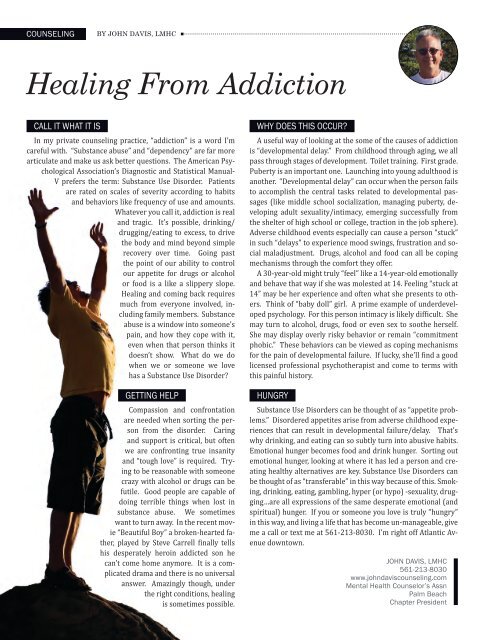Atlantic Ave Magazine - August 2019
You also want an ePaper? Increase the reach of your titles
YUMPU automatically turns print PDFs into web optimized ePapers that Google loves.
counseling<br />
By john davis, lmhc<br />
Healing From Addiction<br />
Call it What it Is<br />
In my private counseling practice, “addiction” is a word I’m<br />
careful with. “Substance abuse” and “dependency” are far more<br />
articulate and make us ask better questions. The American Psychological<br />
Association’s Diagnostic and Statistical Manual-<br />
V prefers the term: Substance Use Disorder. Patients<br />
are rated on scales of severity according to habits<br />
and behaviors like frequency of use and amounts.<br />
Whatever you call it, addiction is real<br />
and tragic. It’s possible, drinking/<br />
drugging/eating to excess, to drive<br />
the body and mind beyond simple<br />
recovery over time. Going past<br />
the point of our ability to control<br />
our appetite for drugs or alcohol<br />
or food is a like a slippery slope.<br />
Healing and coming back requires<br />
much from everyone involved, including<br />
family members. Substance<br />
abuse is a window into someone’s<br />
pain, and how they cope with it,<br />
even when that person thinks it<br />
doesn’t show. What do we do<br />
when we or someone we love<br />
has a Substance Use Disorder?<br />
Getting Help<br />
Compassion and confrontation<br />
are needed when sorting the person<br />
from the disorder. Caring<br />
and support is critical, but often<br />
we are confronting true insanity<br />
and “tough love” is required. Trying<br />
to be reasonable with someone<br />
crazy with alcohol or drugs can be<br />
futile. Good people are capable of<br />
doing terrible things when lost in<br />
substance abuse. We sometimes<br />
want to turn away. In the recent movie<br />
“Beautiful Boy” a broken-hearted father,<br />
played by Steve Carrell finally tells<br />
his desperately heroin addicted son he<br />
can’t come home anymore. It is a complicated<br />
drama and there is no universal<br />
answer. Amazingly though, under<br />
the right conditions, healing<br />
is sometimes possible.<br />
Why Does This Occur?<br />
A useful way of looking at the some of the causes of addiction<br />
is “developmental delay.” From childhood through aging, we all<br />
pass through stages of development. Toilet training. First grade.<br />
Puberty is an important one. Launching into young adulthood is<br />
another. “Developmental delay” can occur when the person fails<br />
to accomplish the central tasks related to developmental passages<br />
(like middle school socialization, managing puberty, developing<br />
adult sexuality/intimacy, emerging successfully from<br />
the shelter of high school or college, traction in the job sphere).<br />
Adverse childhood events especially can cause a person “stuck”<br />
in such “delays” to experience mood swings, frustration and social<br />
maladjustment. Drugs, alcohol and food can all be coping<br />
mechanisms through the comfort they offer.<br />
A 30-year-old might truly “feel” like a 14-year-old emotionally<br />
and behave that way if she was molested at 14. Feeling “stuck at<br />
14” may be her experience and often what she presents to others.<br />
Think of “baby doll” girl. A prime example of underdeveloped<br />
psychology. For this person intimacy is likely difficult. She<br />
may turn to alcohol, drugs, food or even sex to soothe herself.<br />
She may display overly risky behavior or remain “commitment<br />
phobic.” These behaviors can be viewed as coping mechanisms<br />
for the pain of developmental failure. If lucky, she’ll find a good<br />
licensed professional psychotherapist and come to terms with<br />
this painful history.<br />
Hungry<br />
Substance Use Disorders can be thought of as “appetite problems.”<br />
Disordered appetites arise from adverse childhood experiences<br />
that can result in developmental failure/delay. That’s<br />
why drinking, and eating can so subtly turn into abusive habits.<br />
Emotional hunger becomes food and drink hunger. Sorting out<br />
emotional hunger, looking at where it has led a person and creating<br />
healthy alternatives are key. Substance Use Disorders can<br />
be thought of as “transferable” in this way because of this. Smoking,<br />
drinking, eating, gambling, hyper (or hypo) -sexuality, drugging…are<br />
all expressions of the same desperate emotional (and<br />
spiritual) hunger. If you or someone you love is truly “hungry”<br />
in this way, and living a life that has become un-manageable, give<br />
me a call or text me at 561-213-8030. I’m right off <strong>Atlantic</strong> <strong>Ave</strong>nue<br />
downtown.<br />
John Davis, LMHC<br />
561-213-8030<br />
www.johndaviscounseling.com<br />
Mental Health Counselor’s Assn<br />
Palm Beach<br />
Chapter President<br />
70 | <strong>August</strong> <strong>2019</strong> | www.<strong>Atlantic</strong><strong>Ave</strong><strong>Magazine</strong>.com

















